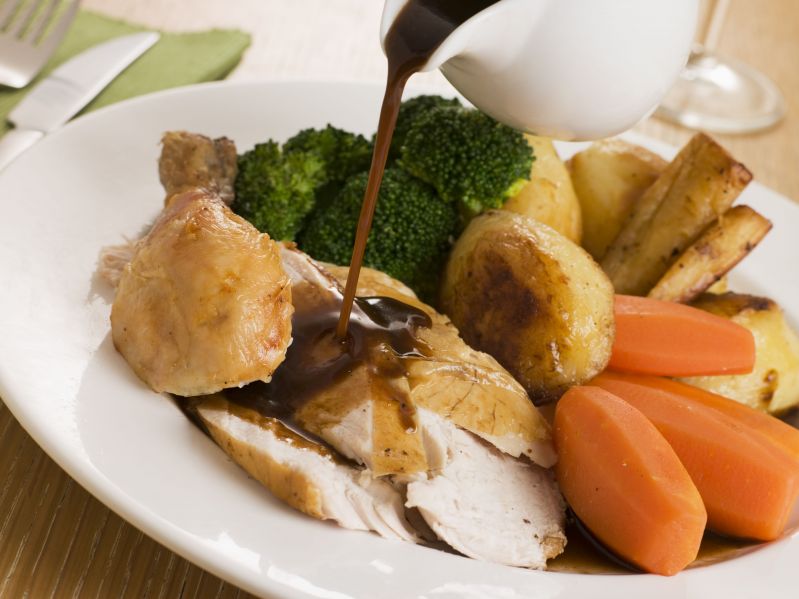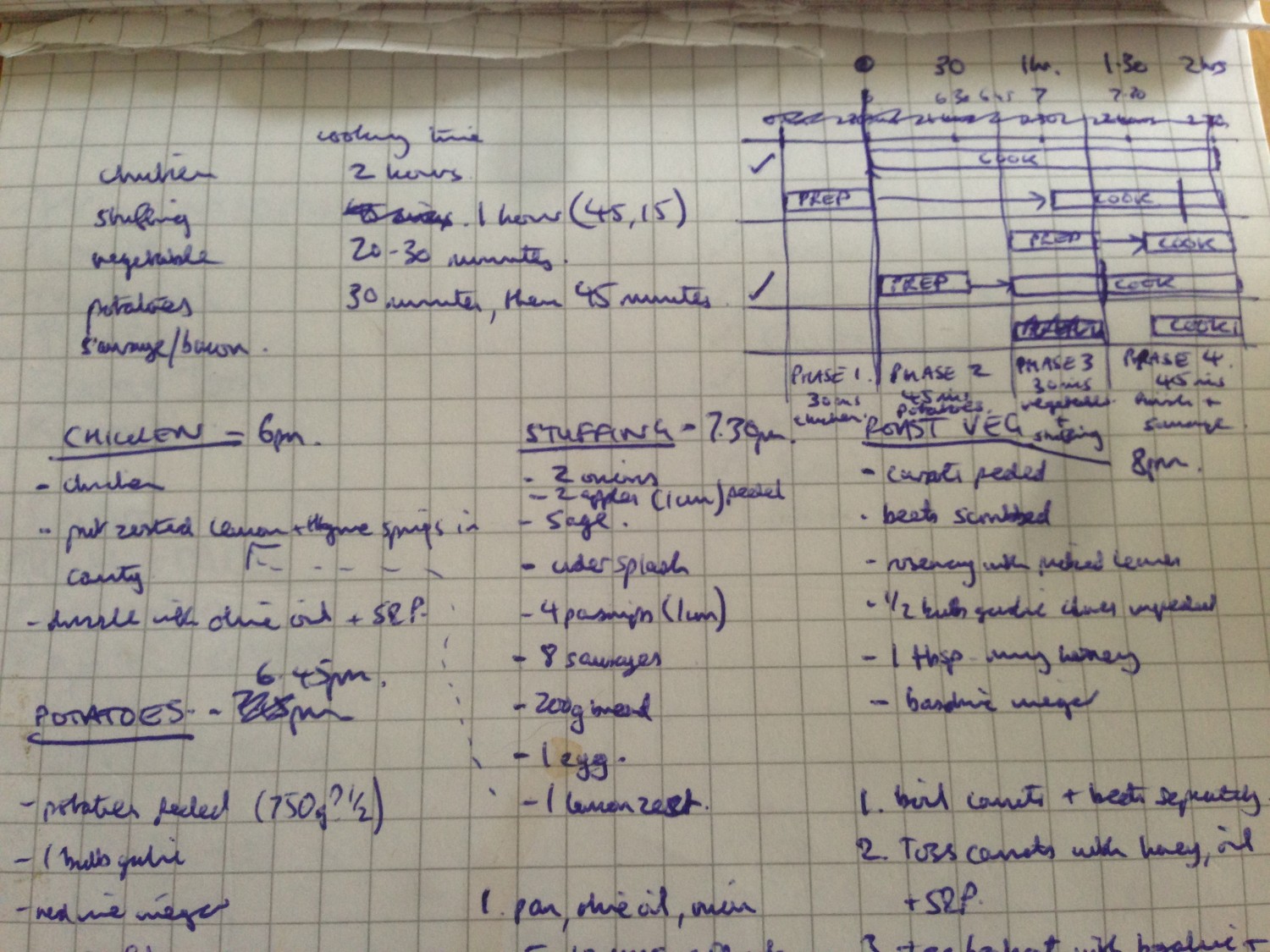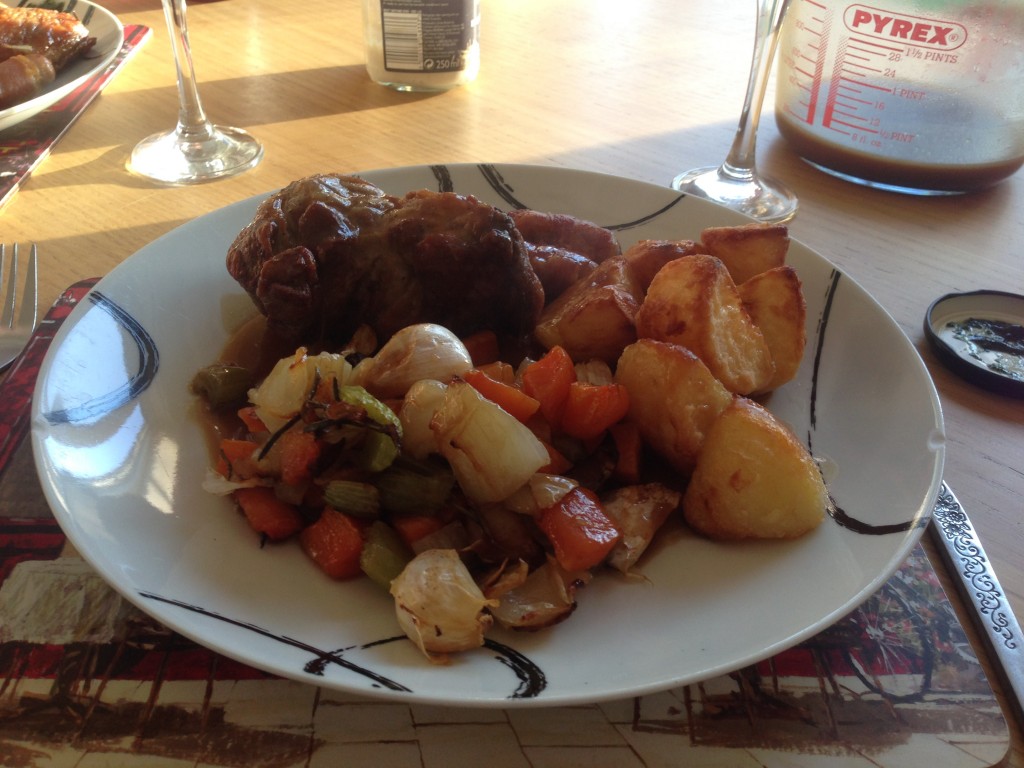
Preparing a roast: instinctive project management?
Gantt charts. Excel spreadsheets. Yawn. This is how some people respond when you ask them what they know about project management. There is the perception that project management is something complicated, technical and rather dull. This was once my own interpretation – a seemingly shocking confession from someone who nowadays counts project plans, risk registers and communication strategies as among his circle of friends. Strip away the jargon, and you’ll find that project management is a lot more common, straightforward and enjoyable than you might think. And many people do it instinctively every time they prepare a roast dinner…
But is project management really instinctive? Early on in my career, I remember a project manager joining our team and encountering professional project management for the first time. To a PRINCE2 padowan like me, it all seemed like a lot of paper and procedures. At the time, I was working on a much smaller project (given to keep me quiet while I learned the ropes I’m sure) and thought that I must not be doing project management correctly. Even though I felt like a fraud next to the PRINCE2 pro, reflecting on the experience, I realise that I had been keeping my own project under control instinctively – keeping costs within the budget, making sure I met the deadline, keeping other people up to date and requesting their input at the appropriate point. Ultimately this is all that project management is really about – controlling variables to ensure that you end up with what you intended. And a whole army of instinctive project managers do this everyday.
- Cost
- Time
- Quality
- Scope
- Risks
- Benefits
1. Cost: Beef or chicken?
Wouldn’t it be wonderful if we had an unlimited budget when it came to food and drink? No more scanning the wine list and only selecting on the basis of price. Sadly, most of us aren’t in that world and so need to (or should!) stick to a budget. The roast dinner is no exception. Do we buy that tempting, prime joint of beef along with those culinary accoutrements from the ‘Finest’ range? Or do we just stick to chicken and use up what’s left in the cupboard and freezer for the rest? It’ll probably depend on whether you’re cooking for yourself or if you’re inviting people over to join in. Once you’ve decided the purpose (or the desired benefit – see 6), you will tailor your budget accordingly. The costs are controlled (or not!) once you’ve passed the supermarket check out.
2. Timescales: rushing about while the meat is cooking!
Cooking a roast dinner really should be the exam of any project management qualification. There are many different elements (the meat, the vegetables, the potatoes) that require various skills (roasting, peeling vegetables, boiling potatoes, preparing sauces) to be utilised at the correct times (staging what goes into the oven – meat first!) – all with the aim that the whole meal comes together at the right time. Many people far better at cooking than me (sadly, they do exist!), will do all of this naturally and the complete meal will miraculously arrive all in one go. Get this wrong, and you could end up with a plate of meat slowly getting cold, while the roast potatoes have another half an hour before they’re ready! I must confess that it is needing to control the timescales for a roast dinner that has me reaching for the pen and sketching out gantt charts in order to get this right!

3. Quality: “Sorry, but my roast potatoes aren’t that great”
I like to think that controlling quality is really about managing expectations – especially when it comes to my cooking. When embarking on a roast dinner, you most likely would have sought to control some elements of quality at the outset (did you decide to buy that ‘Finest’ range product or not?). When actually cooking the meal, controlling the quality invariably involves studiously referring back to the cooking instructions to ensure that the meat does not poison your guests, become too dry, or end up looking like a carbonated Han Solo. However if you’re like me in the kitchen, it might actually be impossible to 100% control the quality. In this case, you manage expectations in advance by letting your diners know that your roast potatoes might not be turn out that great. If they’re expecting something terrible, they’ll be delighted when it isn’t so bad (disclaimer: absolutely not how I manage projects for my clients, unless I invite you over for a roast dinner…).
4. Scope: “I’m not cooking that as well!”
When managing projects, there’s nothing more irritating than ‘scope creep’. That is, when new elements keep being added over time which can really affect all the other variables you’re trying to control. If anything new is to be added to a project, this should be carefully thought out in relation to the original aims. The roast dinner is no exception. When you’re halfway through cooking, you don’t want to suddenly receive a request for pigs in blankets, cauliflower cheese, or brussel sprouts (you never know…). Having to factor these in as well at such short notice could distract you and end up adversely affecting the rest of the meal. If you suddenly find out that one of your guests has a dietary requirement (though this shouldn’t happen if you’d properly considered the risks – see 5.), you may decide that you do need to amend the scope, but this should be the exception rather than the rule.
5. Risk: keeping the wine handy
We’ve looked at some elements of roast dinner risk management such as preventing cooking disasters (see 3) and accommodating specialist needs (see 4). This element of managing a project is about thinking through all of the possible risks (i.e. what could go wrong) and then putting in place measures to either prevent them (e.g. ensuring a vegetarian option) or reducing their impact (e.g. warning your guests that your potatoes will be awful). While you might be doing everything you can to ensure that your dinner is a success, you might actually be keeping those takeaway menus in reserve in case of complete disaster. Or if you have your mother-in-law as one of the guests, risk management could simply be to ply her with copious quantities of wine so that she doesn’t notice the standard of your cooking…
6. Benefit: “We had a lovely time!”
Unless you were cooking for yourself in which case the project benefit was simply to prepare something to keep you nourished, it is well worth keeping sight of this variable. It is about maintaining perspective. If your aim is to prepare a roast dinner live on Masterchef and win (the benefit) then absolutely you’ll be focussing on the cooking process itself to ensure that the tastes are to die for. If you are cooking a roast dinner as part of a social gathering, everyone having a lovely time will be more important than the food itself (think Bridget Jones and her blue soup). I had a wonderful time catching up with friends over a roast dinner recently, all prepared by a mutual friend. While she kept fretting about how the food tasted (it was amazing by the way), had she reminded herself of the main benefit of the meal – to bring us together for a catch up – she could have realised sooner that it was a great success.
A project manager in every home kitchen
So everyday, home kitchens are filled with instinctive project managers controlling the 6 variables that underpin good project management: cost, timescales, quality, scope, risk and benefit. You don’t need to be a PRINCE2 whizz to be a highly effective project manager. On that note, I’ll stop writing and get myself into the kitchen to prepare today’s Sunday roast – wine already forms part of my risk management strategy…
If you’re looking for project management support that does not require a decent roast dinner, SBSA can help you. As always, get in touch if you need some initial guidance without any obligation.
